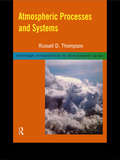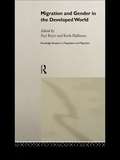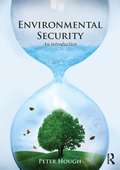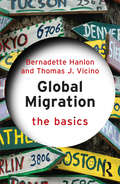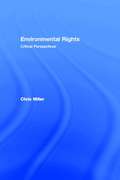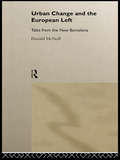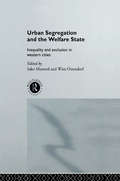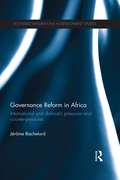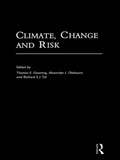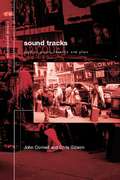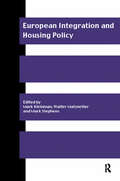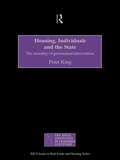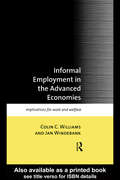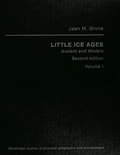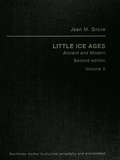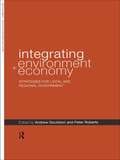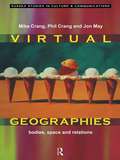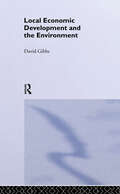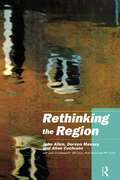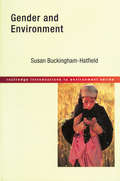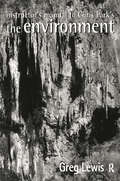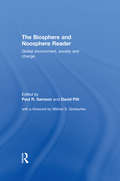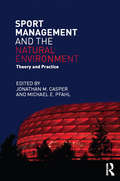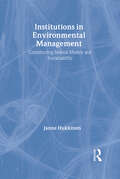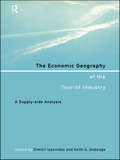- Table View
- List View
Atmospheric Processes and Systems (Routledge Introductions to Environment: Environmental Science)
by Russell D. ThompsonAtmospheric Processes and Systems presents a concise introduction to the atmosphere and the fundamentals of weather. Examining different aspects of the mass, energy and circulation systems in the atmosphere, this text provides detailed accounts of specific phenomena, including* the composition and structure of the atmosphere* energy transfers* the cycle of atmospheric water in terms of evaporation, condensation and precipitation* pressure and winds at the primary or global scale* secondary air masses and fronts* thermal differences and weather disturbances.The text includes sixteen boxed case studies, annotated further reading lists and a glossary of key terms.
Migration and Gender in the Developed World (Routledge Research in Population and Migration)
by Paul Boyle Keith HalfacreeThe subject of migration has traditionally been analysed through the lens of economic factors. The importance of adopting a gender sensitive perspective to academic work is now generally appreciated. Migration and Gender in the Developed World contains chapters from a diverse range of leading contributors who apply such a perspective to the study of migration in the countries of the developed world. Each chapter demonstrates how migration is highly gendered, with the experiences of women and men often varying markedly in different migration situations. The volume covers a wide range of migration issues and draws out the importance of gender issues in each area, including: dual career households regional migration patterns emigration from Ireland and Hong Kong elderly migration the migration decision-making process and the costs and benefits attached to migration Approaching the subject from a variety of academic traditions including Geography, Sociology and Social Policy, the volume combines both quantitative analysis of factual data and qualitative analysis of interview material to demonstrate the importance of studying migration through gender sensitive eyes.
Environmental Security: An Introduction
by Peter HoughThis student-friendly textbook offers a survey of the competing conceptions and applications of the increasingly prominent notion of environmental security. The book is divided into three sections. In the first, the key theoretical and practical arguments for and against bringing together environmental and security issues are set out. The book then goes on to present how and why environmental issues have come to be framed in some quarters as ‘national security‘ concerns in the context of the effects of overpopulation, resource depletion, climate change and the role of the military as both a cause and a solution to problems of pollution and natural disasters. Finally, the third section explores the case for treating the key issues of environmental change as matters of human security. Overall, the book will provide a clear, systematic and thorough overview of all dimensions of an area of great academic and ‘real-world’ political interest but one that has rarely been set out in an accessible textbook format hitherto. This book will be essential reading for students of environmental studies, critical and human security, global governance, development studies, and IR in general.
Global Migration: The Basics (The Basics)
by Bernadette Hanlon Thomas J. VicinoMigration is a politically sensitive topic and an important aspect of contentious debates about social and cultural diversity, economic stability, terrorism, globalization, and nationalism. Global Migration: The Basics examines: history and geography of global migration the role of migrants in society impact of migrants on the economy and the political system policy challenges that need to be faced in confronting a rapidly changing world economy and society. This book challenges students of geography, political science, public policy, sociology, and economics to look beyond the rhetoric and consider the real and basic facts about migration. Through detailed examinations of the scholarly literature, demographic patterns, and public policy debates, Global Migration: The Basics exposes readers to the underlying causes and consequences of migration.
Environmental Rights: Critical Perspectives (Esri Working Papers In Policy Studies)
by Chris MillerEnvironmental Rights offers new perspectives on contemporary debates over rights and environmental issues. It draws on key theories of contemporary philosophers and jurists and case reports from decisions in English, European and US courts. It also examines recent developments within environmental law and policy in the UK and the EU. Specific rights of the individual are examined - the right to clean air and water, access to information, the right to participate in environmental decisions - as well as the practical obstacles to the exercising of these rights.
Urban Change and the European Left: Tales from the New Barcelona
by Donald McNeillUrban Change and the European Left looks at the way politicians and critics use the city to ground their political messages.The book explores local narratives of urban change through ethnography, biography, travelogue, and social history. Drawing on novels, architectural commentaries, urban plans, political speeches, history and autobiography, Urban Change and the European Left provides accounts of public art, architecture, grassroots struggles, battles for control of the 1992 Olympics, and the city and Catalan identity.
Urban Segregation and the Welfare State: Inequality and Exclusion in Western Cities
by Sako Musterd Wim OstendorfUrban Segregation and the Welfare State examines ethnic and socio-economic segregation patterns, social polarisation, and social exclusion in major cities in the Western world. Contributors from across North America and Europe provide in-depth analysis of particular cities, ranging from Johannesburg, Chicago and Toronto to Amsterdam, Stockholm and Belfast. The authors highlight the social problems in and of cities, indicating differences between nation-states in terms of economic restructuring, migration, welfare state regimes and "ethnic history".
Governance Reform in Africa: International and Domestic Pressures and Counter-Pressures (Routledge Explorations in Development Studies)
by Jerome BachelardPoor governance is increasingly recognized as the greatest impediment to economic development in Sub-Saharan Africa. Currently, some impressive governance reforms are underway in many countries. This includes cases such as Nigeria – formerly the most corrupt country in the world according to Transparency International. Yet other countries such as Chad are still in reform deadlock. To account for these differences, this book examines governance reform in Sub-Saharan Africa based on an analysis of international and domestic pressures and counter-pressures. It develops a four phase model explaining why governance reforms advance in some instances, whilst in others governance reforms stagnate or even relapse. No study has sought to systematically examine the political forces, both international and domestic, behind the successful conduct of governance reform in Sub-Saharan Africa. Yet, coordination, collaboration and mutual support between international and domestic actors is critical to push individual governments onto the path of reform. This book shows that while international and domestic pro-reform pressures are important, an analysis of anti-reform pressures is also necessary to explain incomplete or failed reform. The main theoretical arguments are structured around four hypotheses. The hypotheses are theoretically generated and tested over four case studies – Madagascar, Kenya, Nigeria and Chad. On this basis, the good governance socialization process is inductively developed in the concluding chapter. This model illustrates how governance practices can evolve positively and negatively in all countries of Sub-Saharan Africa, based on the nature and relative strength of international and domestic pressures and counter-pressures.
Climate, Change and Risk
by Thomas E. Downing Alexander J. Olsthoorn Richard S.J. TolClimate, Change and Risk presents an overview of 'extreme' weather related events and our ability to cope with them. It focuses on society's responses, insurance matters and methodologies for the analysis of climatic hazards. Drawing on worldwide research from the leading names in the field this volume explores the changes in weather hazards that might be expected as the global climate changes.
Sound Tracks: Popular Music Identity and Place (Critical Geographies)
by Chris Gibson John ConnellSound Tracks is the first comprehensive book on the new geography of popular music, examining the complex links between places, music and cultural identities. It provides an interdisciplinary perspective on local, national and global scenes, from the 'Mersey' and 'Icelandic' sounds to 'world music', and explores the diverse meanings of music in a range of regional contexts.In a world of intensified globalisation, links between space, music and identity are increasingly tenuous, yet places give credibility to music, not least in the 'country', and music is commonly linked to place, as a stake to originality, a claim to tradition and as a marketing device. This book develops new perspectives on these relationships and how they are situated within cultural and geographical thought.
European Integration and Housing Policy (Routledge/rics Issues In Real Estate And Housing Ser.)
by Mark Stephens Mark Kleinman Walter MatznetterThis book presents a series of debates arising from the housing needs of different EU countries. The authors address key issues by examining in turn: * the consequences of European integration for different housing markets * the impact of the Maastricht Treaty and other policy documents * the social consequences of integration including income distribution, homelessness and marginal housing estates * current housing policy in the Nordic countries and in Eastern Europe.
Housing, Individuals and the State: The Morality of Government Intervention (Rics Issues In Real Estate And Housing Ser.)
by Peter KingCan the state solve housing problems or does it create them? This book explores the question by combining a detailed critique of contemporary housing policy with a philisophical analysis of the role of the state and individuals. Examining the state's role as controller and funder of housing, the author contends that the state is not capable of planning and controlling a sustainable housing policy.
Informal Employment in Advanced Economies: Implications for Work and Welfare
by Colin C. Williams Jan WindebankRe-Placing Informal Employment challenges many of the popular myths surrounding informal economic activities, and offers a radical reassesment of their extent, growth, location and nature. The book uses case studies from the UK, France, Italy, the Netherlands, the US and Canada to challenge: * the popular belief that informal employment is growing throughout the advanced economies * the myth that this work is undertaken mostly by marginalized groups * the dominant view that we should replace informal with formal employment through enforcement of regulations. Examining policy options and their consequences, the authors show that conventional approaches only increase inequalities and that a radical alternative solution is essential.
Little Ice Ages Vol1 Ed2: Ancient And Modern (Routledge Studies In Physical Geography Ser. #Vol. 5)
by Jean M GroveFirst published in 2004. Since The Little Ice Age was published in 1988, interest in climatic history has grown rapidly and research in the area has flourished. A vast amount of new data has become available from sources such as ice cores, speleothems and tree rings. The picture that we have of past climates and glacier oscillations has extended further into the past and has become more detailed. However, the knowledge of climate change on the decennial and centennial timescale, to which glacier history can contribute, is scarce and is in demand when attempting to predict future change, especially with regard to global warming. New chapters and material have been included throughout the book, which tend to confirm and elaborate on the conclusions of the first edition. The glacial evidence has been presented in the context of the oceanographic and icecap studies that have provided such exciting results. Little Ice Ages is structured in three parts: • Part 1 details the evidence for glacier variations in the last thousand years in different parts of the world and the associated climatic fluctuations. • Part 2 brings together the evidence for the timing of glacier variations in the course of the Holocene. • Part 3 views the Holocene record in a longer time context, especially as it appears in ice cores, and goes on to consider the likely causes of climatic variability on a Little Ice Age timescale and some of its physical, biological and human consequences. It becomes apparent in Little Ice Ages that the glacier record provides a valuable indication of the nature of climatic fluctuations on the land areas of the globe. The record points to periods of cooling which were more numerous and less continuous than was believed to be the case twenty years ago. There appears to be no single explanation for the variability. Volcanism, solar variability and ocean currents have all played their parts and prediction continues to present many problems. Some authorities have thrown doubt on the existence of the Little Ice Age, but Little Ice Ages makes the case for a climatic sequence that can usefully be called the Little Ice Age and which had predecessors occurring at intervals of several centuries throughout much of the last 10,000 years.
Little Ice Ages Vol2 Ed2: Ancient And Modern (Routledge Studies In Physical Geography Ser. #Vol. 5)
by Jean M GroveFirst Published in 2004. Routledge is an imprint of Taylor & Francis, an informa company.
Integrating Environment and Economy: Strategies for Local and Regional Government
by Peter Roberts Andrew GouldsonIntegrating Environment and Economy provides a detailed and accessible examination of how integrated approaches enable economic and social activities to support environmental objectives. This is a key text for the many taught Masters courses covering the issues of environmental management and economic development Features of the book:* covers strong areas of undergraduate and postgraduate study* detailed practice-based case studies at both local and regional levels* up-to-date theory using real-life examples
Virtual Geographies: Bodies, Space and Relations (Sussex Studies in Culture and Communication)
by Mike Crang Jon May Phil CrangThis book examines the interrelationship between telecommunications and tourism in shaping the nature of space, place and the urban at the end of the twentieth century. They discuss how these agents are instrumental in the production of homogenous world-spaces, and how htese, in turn, presuppose new kinds of political and cultural identity.Virtual Geographies explores how new communication technologies are being used to produce new geographies and new types of space. Leading contributors from a wide range of disciplines including geography, sociology, philosophy and literature:* investigate how visions of cyberspace have been constructed* offer a critical assessment of the status of virtual environments and geographies* explore how virtual environments reshape the way we think and write about the world. This book sets recent technological developments in a historical and geographical perspective to offer a clearer view of the new vistas ahead.
Local Economic Development and the Environment
by David GibbsThis book focuses upon the potential to integrate economic and environmental policies at the local and regional scale. Local initiatives are investigated within their wider economic and environmental policy contexts in order to illustrate both the constraints and opportunities for local policy makers. Attention is given to global economic trends, as well as to the specific policy contexts of the European Union and the national contexts of the UK, USA, Australia, Japan and Sweden. The key principles for designing integrative policies and descriptions of initiatives and projects in a variety of locations are also considered.
Rethinking the Region: Spaces of Neo-Liberalism
by John Allen Doreen Massey Allan Cochrane Nick Henry with Julie Charlesworth Gill Court Phil SarreRethinking the Region argues that regions are not simply bounded spaces on a map. This book uses unique research of England during the 1980s to show how regions are made and unmade by social processes. The book examines how new lines of division both social and geographical were laid down as free-market growth and reconstructed this are as a `neo-liberal' region. The authors argue that a more balanced form of growth is possible - within and between regions as well as between social groups. This book shows that to grasp the complexities of growth we must rethink `the region' in time as well as in space.
Gender and Environment
by Susan BuckinghamAccessible and lively, this is the first introductory level text to introduce the key issues in the rapidly growing area of gender and environment. This text provides an analysis of how gender relations affect the natural environment and of how environmental issues have a differential impact on women and men.Using case studies from the developed and developing worlds, this text covers· gendered roles in the family· community and international connections· conception· giving birth· western practices· the body and the self.
Instructor's Manual to Chris Park's The Environment
by Greg LewisThe very survival of the planet is at risk: human misuse of natural resources and disturbance of natural environmental systems is pushing the Earth to the limits of its capacity. The Environment is a lively, comprehensive introduction for environmental study, explaining how the environment functions, how environmental systems relate, and the ways in which people and environment interact. Focussing particularly on the environmental impacts of human activities, the book explains the ways in which an understanding of basic physical principles can help us to use the environment and its resources. Three particular approaches are adopted throughout: * a systems approach - highlighting the interactions and interrelationships between the environment's diverse parts * an interdisciplinary perspective - stepping back from individual subject focus to examine the complex breadth of the environment's diversity * a global perspective - incorporating stimulating examples drawn from around the world to illustrate broad global patterns and contrasts. The Environment explains the principles and applications of the different parts of the Earth's system: the lithosphere, the atmosphere, the hydrosphere, and explains the interrelationship across these systems. It explores the present environmental crisis, examines how the planet Earth fits into the wider universe, and explores human-environment interactions, to offer a clear understanding of the diverse and complex environment we live in and new ways of thinking about the way it is changing. Specific features include: * Lively, stimulating and accessible text * Superb illustrations: 4-colour plate sections * Case studies drawn from around the world, boxed within the text * Chapter summaries * Annotated further reading lists A Lecturer's Manual is available to accompany the text
The Biosphere and Noosphere Reader: Global Environment, Society and Change
by David Pitt Paul R. SamsonThe Reader is the first comprehensive history of the noosphere and biosphere. Drawing on classical influences, modern parallels, and insights into the future, the Reader traces the emergence of noosphere and biosphere concepts within the concept of environmental change. Reproducing material from seminla works, both past and present, key ideas and writings of prominent thinkers are presented, including Bergson, Vernadsky, Lovelock, Russell, Needham, Huxley, Medawar, Toynbee and Boulding, and extensive introductory pieces bu the editors drawattention to common themes and competing ideas. Focussing on issues of origins, theories, parallels and potential, the discussions place issues in a broad context, compare and contrast central concepts with those of the Gaia hypothesis, sustainability and global change, and examine the potential application of noospheric ideas to current debates about culture, education and technology in such realms as the Internet, space exploration, and the emergence of super-consciousness. Literally the `sphere of mind or intellect', the noosphere is aprt of the `realm of the possible' in human affairs, where there is a conscious effort to tackle global issues The noosphere concept captures a number of key contemporary issues - social evolution, global ecology, Gaia, deep ecology and global environmental change - contributing to ongoing debates concerning the implications of emerging technologies.
Sport Management and the Natural Environment: Theory and Practice
by Jonathan M. Casper Michael E. PfahlWith climate change and other environmental issues becoming increasingly prominent, any successful sport organization now has to incorporate environmental concerns into their business strategy, while all sport managers must understand how to implement environmental initiatives into their everyday business. Sport Management and the Natural Environment is the first book to introduce environmental theory and best practice in the context of sport management, demonstrating how sport organizations can become more effective and sustainable, and exploring the important advocacy role that sport organizations have in local and global communities. It considers the unique social, economic and political space that sport occupies in society, and examines the most important practical managerial issues related to sport and the environment, including: Facilities Finance and accounting Leadership Marketing, communication and digital media Operations Stakeholder relations Strategic planning Including contributions from leading academics and practitioners, Sport Management and the Natural Environment is the perfect foundation text for any course touching on environmental issues or social responsibility in sport, and essential reading for any sport manager looking to improve their professional practice.
Institutions in Environmental Management: Constructing Mental Models and Sustainability (Routledge/EUI Studies in Environmental Policy #Vol. 4)
by Janne HukkinenThis work explores the difficulties of solving contemporary environmental problems within existing global institutions. It questions guidelines set out in recent influential policy reports, and suggests new agendas for sustainability, industrial ecology, and institutional reform. Including case studies from the USA, Europe and China, this book investigates a wide range of environmental problems presently confronting experts worldwide.
The Economic Geography of the Tourist Industry: A Supply-Side Analysis
by Dimitri Ioannides Keith G. DebbageThe Economic Geography of the Tourist Industry bridges the gap between tourism research and economic geography by bringing together leading academics in geography, planning and tourism. The authors explain tourism's definitions and examine whether tourism can be categorized as an industry. They provide detailed analyses of key sectors, such as tour
